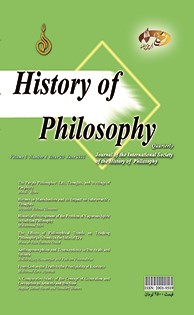The Purple Philosopher: Life, Thoughts, and Writings of Porphyry
Subject Areas : Philosophical thoughts in ancient Iran
1 - Tehran University
Keywords: Porphyry Neo-Platonic Philosophy Plotinus,
Abstract :
Porphyry or porphyries (meaning clad in purple) is the name of one of the most prominent exponents of Neo-Platonic Philosophy. Both the philosopher himself and his school exercised an undeniable influence over Islamic philosophy in the past. His doctrine of the five universals can be seen in the preface of all logical books of the Islamic period in a more analytic and extensive fashion. His theory of the union of the intellect and the intelligible was first degraded by Ibn Sina and then accepted and expanded by Mulla Sadra. Becoming God-like as the end of ethics was a doctrine which Porphyry had borrowed from his master Plotinus, and which Muslim thinkers unanimously accepted. Moreover, a taint of Porphyry’s belief in transmigration can be observed in some of the words of Farabi and Ibn Sina. However, both of them rejected the Greeks’ idea of transmigration. Porphyry placed logic at the top of the educational system of the Neo-Platonic School, which influenced Muslim Neo-Platonists’ attention to logic. He believed in the fundamental agreement between Plato, Aristotle, and perennial philosophy, both of which clearly affected Farabi’s ideas in particular.
ابنسينا، الإشارات و التنبيهات، شرح خواجه نصيرالدين الطوسي و قطبالدين الرازي، قم، نشر البلاغة، ۱۳83.#
ابنسينا، الشفاء: الطبيعيات: النفس، تصدير و مراجعة ابراهيم مدكور، تحقيق جورج قنواتي و سعيد زايد، الهيئة المصرية العامة للكتاب، قاهره، ۱۹۷۵م. #
ابنسينا، المبدأ و المعاد، باهتمام عبدالله نوراني، تهران، مؤسسة مطالعات اسلامي، 1363. #
ابنالنديم، أبوالفرج محمد بن اسحاق، الفهرست، تحقيق إبراهيم رمضان، بيروت، 1997م. #
اخوانالصفا، رسائل إخوان الصفاء و خلّان الوفاء، بيروت، الدار الإسلامية، 4 ج، 1412ق. #
خراساني، شرفالدين، «اتّحاد عاقل و معقول»، دايرة المعارف بزرگ اسلامي (نسخه اينترنتي)، ج6، مقالة ش 2698. #
خوانساري، محمّد، «تعريف فلسفه به تشبّه به الله»، خرد جاودان (مجموعه مقالات اهدايي به استاد سيد جلالالدين آشتياني)، نشر فروزان، 1377. #
ذهبي، عبّاس، «تناسخ»، دايرة المعارف بزرگ اسلامي (نسخه اينترنتي)، ج16، مقالة ش 6103. #
ملاصدرا، الحکمة المتعالية في الأسفار العقلية الأربعة، بيروت، دار إحياء التراث العربي، 9 ج، ۱۴۲۳ق. #
ملاصدرا، شرح و تعليقه بر الهيات شفا، تصحيح، تحقيق و مقدّمه نجفقلي حبيبي؛ باشراف استاد سيدمحمد خامنهاي، انتشارات بنياد حکمت اسلامي صدرا، تهران، 2 ج، 1382.
ملاصدرا، إيقاظ النائمين، مقدّمه و تصحيح محسن مؤيدي، تهران، مؤسسه مطالعات و تحقيقات فرهنگي، 1361. #
ملاصدرا، تفسير القرآن الکريم، قم، انتشارات بيدار، 1411ق. #
فرفوريوس، ايساغوجي، (بهمراه مقولات ارسطو)، ترجمه و مقدّمه محمّد خوانساري، تهران، مرکز نشر دانشگاهي، 1383. #
فلوطين، تاسوعات أفلوطين، تعريب فريد جبر، مراجعه و تصحيح جيرار جهامي و سميح دغيم، بيروت، مکتبة لبنان ناشرون، 1997م. #
Barnes, J., Porphyry: Introduction, translated with a commentary by Jonathan Barnes, Clarendon Press, Oxford, 2003. #
Copleston, F., A History of Philosophy: Volume I: Greece and Rome, Doubleday, 1993. #
Edwards, M., Neoplatonic Saints: The Lives of Plotinus and Proclus by their Students, Liverpool University Press, 2000. #
Emilson, E. K., “Neo-Platonism”, in Routledge History of Philosophy, vol. 11 (from Aristotle to Augustine), ed. David Furley, Routledge, London & New York, 1999. #
Fakhry, M., Fārābi, Founder of Islamic Neoplatonism: His Life, Works and Influence, Oneworld Publications, Oxford, 2002. #
Lloyd, A. C., “Neoplatonic Logic and Aristotelian Logic: I”, Phronesis, vol. 1, no. 1 (Nov.,1955), pp. 58-72. #
Siorvanes, L., “Porphyry”, in Routledge Encyclopedia of Philosophy, ed. Edward Craig, vol.7, Routledge,1998. #


